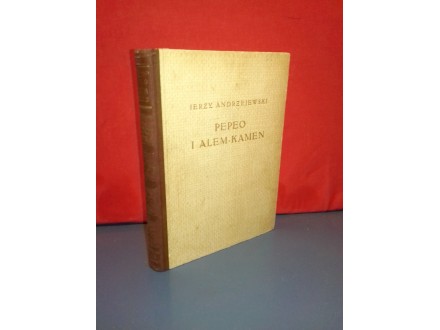PEPEO I ALEM-KAMEN - Jerzy Andrzejewski
| Cena: |
| Želi ovaj predmet: | 3 |
| Stanje: | Polovan sa vidljivim znacima korišćenja |
| Garancija: | Ne |
| Isporuka: | Pošta Post Express Lično preuzimanje |
| Plaćanje: | Tekući račun (pre slanja) Pouzećem Lično |
| Grad: |
Novi Sad-Petrovaradin, Novi Sad |
Godina izdanja: Ostalo
ISBN: Ostalo
Jezik: Hrvatski
Autor: Strani
Izdavač: Matica hrvatska, Zagreb
Godina izdanja: 1948.
Povez: Tvrd
Broj strana: 274
Stanje: Dobro - Veoma dobro
Born in Warsaw in 1909, Andrzejewski studied philology at the University of Warsaw in the Second Polish Republic. In 1932 he debuted in ABC Magazine with his first short story entitled Wobec czyjegoś życia. In 1936 he published a full collection of short stories called Drogi nieuniknione, in Biblioteka Prosto z mostu, and soon received broad recognition for his new, Catholic-inspired novel Ład serca from 1938.
During World War II he was involved in efforts to aid the Jewish refugees.[3] His short novel Holy Week (1945) has been described as `arguably the first literary attempt to examine the behavior of Poles facing the Holocaust`.[4]
Immediately after World War II, Andrzejewski published the volume Night (Noc, 1945) and his most famous novel so far, Ashes and Diamonds (Popiół i diament, 1948). Having joined the Polish United Workers` Party (PZPR) in 1950, he left the party after the 1956 Polish October protests and riots.[5] After the suppression of the Prague Spring, in which Polish troops participated, Andrzejewski wrote a letter of apology to Eduard Goldstücker, the chairman of the Czechoslovak Writers Union.[citation needed] In 1964 he was one of the signatories of the so-called Letter of 34 to Prime Minister Józef Cyrankiewicz regarding freedom of culture. In 1976 Andrzejewski was one of the founding members of the intellectual opposition group KOR (Workers` Defence Committee). Later, Andrzejewski was a strong supporter of Poland`s anti-Communist Solidarity movement.
Although he was frequently considered a front-runner for the Nobel Prize for Literature, he never received the honor. His purported alcoholism in his later years may have hindered his literary output, thus preventing him from ever becoming a true moral authority.[5]
He died of a heart attack in Warsaw in 1983.
- do 100 g: 172 dinara
- 100g - 250 g: 190 dinara
- 250g - 500 g: 212 dinara
- 500g - 1000 g: 225 dinara
- 1000 - 2000 g: 264 dinara
Visina poštarine za poštanski paket:
- do 3 kg: 340 dinara
- 3 kg - 5 kg: 390 dinara
- 5 kg - 10 kg: 480 dinara
POŠTARINA ZA POST EXPRESS POUZEĆE JE OD 540 DINARA PA NAVIŠE.
LIČNO PREUZIMANJE JE U PETROVARADINU (MAŽURANIĆEVA)
BESPLATNA DOSTAVA SE ODNOSI NA SLANJE POŠTOM (PREPORUČENA POŠILJKA ILI PAKET).
Za plaćanje pouzećem, slanje Postexpress-om.
Plaćanje iz inostranstva preko Western Union-a, a slanje redovnom poštom.
Ostali predmeti iz moje ponude:
http://www.kupindo.com/Clan/laonzd/SpisakPredmeta
Predmet: 69646725









